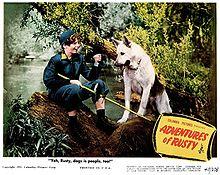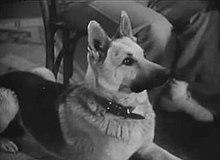 Lobby card for Adventures of Rusty (1945), the first of eight "Rusty" films, and the only one starring Ace the Wonder Dog | |
| Species | Dog |
|---|---|
| Breed | German Shepherd Dog |
| Born | Before 1938 |
| Died | After 1946 |
| Occupation | Actor |
Ace the Wonder Dog was a German Shepherd Dog that acted in several films and film serials from 1938 to 1946. His first appearance was in the 1938 Lew Landers film Blind Alibi. He is considered by many critics an attempt by RKO Pictures to cash in on the success of Warner Bros.' canine sensation, Rin Tin Tin.[1]
After making several program pictures for RKO, Ace moved to Republic Pictures for several more projects, before moving to Columbia Pictures for a role as the Phantom's sidekick "Devil" in the serial The Phantom in 1943.[2]
His declining popularity meant that most of his appearances after RKO's initial burst of "Ace" publicity were for Monogram and the Poverty Row studio Producers Releasing Corporation.[3] In 1945, he appeared as "Rusty" in The Adventures of Rusty, the first of Columbia's eight "Rusty" films. He did not reprise the role in any of the subsequent installments.
Ace is just one of a number of "Wonder Dogs" in the history of fictional dogs. Others include Rin Tin Tin (billed during his 1930 radio show as "Rin Tin Tin, the Wonder Dog"), Pal the Wonder Dog, Gaspode the Wonder Dog, Rex the Wonder Dog from silent films, and another unrelated Rex the Wonder Dog from DC Comics.
Filmography
- Blind Alibi (1938)
- Orphans of the Street (1938)
- Home on the Range (1938)
- Almost a Gentleman (aka Magnificent Outcast) (1939)
- The Rookie Cop (aka Swift Vengeance) (1939)
- Girl from God's Country (1940)
- The Girl from Alaska (1942)
- War Dogs (aka Pride of the Army, aka Unsung Heroes) (1942)
- Silent Witness (aka Attorney for the Defense) (1943)
- Headin' for God's Country (1943)
- The Phantom (1943)
- The Monster Maker (1944)
- Adventures of Rusty (1945)
- Danny Boy (1946)
- God's Country (1946)
References
- ^ ""Almost a Gentleman" review". The New York Times. Baseline. All Media Guide, LLC, The New York Times Company. Archived from the original on 22 December 2007. Retrieved 28 February 2019.
- ^ "Uncle Earl's Classic TV Channel". www.solie.org.
- ^ Steinberg, Jay S. "No Animals Were Harmed During These Films". Turner Classic Movies. Time Warner Company. Archived from the original on 30 September 2007. Retrieved 28 February 2019.
External links
- Ace the Wonder Dog at IMDb
